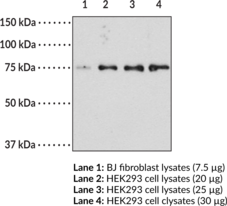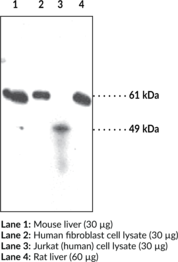Description
Calcitonin gene-related peptide (CGRP) is a 37-amino acid neuropeptide.{41395} It exists in two major forms that share greater than 90% sequence homology, α-CGRP that is produced by alternative RNA splicing of the calcitonin gene CALCI and β-CGRP that is encoded by CALCII in humans. CGRP is primarily expressed in A and Cδ fibers and exhibits perivascular localization but is also expressed in keratinocytes and endothelial progenitor cells.{41395,53682} CGRP binds to a heteromeric complex of calcitonin receptor-like receptor (CRLR) and receptor activity-modifying protein 1 (RAMP1) and has roles in efferent function, nociception, and vasodilation. Levels of CGRP are increased in various pain states, including migraine. It also suppresses TNF-α, increases fibroblast motility and extracellular matrix synthesis, and induces Schwann cell proliferation to facilitate peripheral nerve regeneration following injury.{53683} Cayman’s CGRP Monoclonal Antibody (Clone 4901) can be used for ICC applications.
Synonyms: Calcitonin Gene-Related Peptide
Immunogen: Rat α-CGRP
Formulation: 100 µl of protein G-purified mouse monoclonal antibody
Isotype: IgG2a
Applications: ICC
Origin:
Stability: 365 days
Application|Immunocytochemistry||Product Type|Antibodies|Monoclonal Antibodies||Research Area|Cardiovascular System|Cardiovascular Diseases||Research Area|Cardiovascular System|Vasculature|Vasoconstriction||Research Area|Cardiovascular System|Vasculature|Vasodilation||Research Area|Neuroscience|Pain Research


